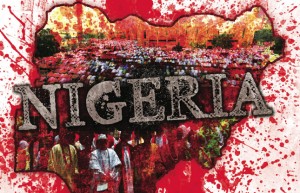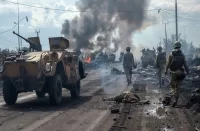We often find ourselves cruelly reminded of the primacy of ‘news values’. Last September, up to 50 male students at a college in northeast Nigeria were slaughtered: many burned alive, those fleeing drowned in showers of bullets.
The news was reported by a few wires.
Again in February, 59 boys were locked in Buni Yadi College and burned alive for the “crime” of seeking an education. Girls were invariably spared, ordered to abandon school, get married and procreate.
The promiscuous and wholesale killing of Nigerian students and villagers by Boko Haram fanatics just wasn’t that newsworthy.
That changed in the most striking way when around 300 schoolgirls were abducted overnight from the northeast town of Chibok. They quickly became everyone’s girls. Social media exploded with #bringbackourgirls, thousands rallied in solidarity, celebrities took black and white photos holding signs: the news coverage was ubiquitous.
 Here is a link to a graphic illustrating online interest in the girls.
Here is a link to a graphic illustrating online interest in the girls.
In a communique, Boko Haram’s leader Abubakar Shekau jeered: “I abducted your girls, I will sell them in the market, by Allah. I will sell them off and marry them off.”
Boko Haram means “Western education is sinful” and this is why schools and universities are regular targets. The Sunni group aims to establish an Islamic State in Nigeria’s mostly Muslim north, attacking signs of ‘degeneracy’. Earlier this year dozens were blown up for watching the football World Cup.
Boko Haram took up arms against the state in 2009 and, if successful, they would hurl Africa’s top oil exporter, largest economy and most populous nation back to the darkness and ignorance of the 7th century.
Perhaps if more had looked into a camera, in solemn black and white, holding #bringbackourgirls placards, they might now be returned. As it stands, 219 schoolgirls remain the slaves of Boko Haram six months after they were snatched. Some have escaped, some have died – most remain hidden in the forests.
Watch a horrific account of some girls who escaped.
A brief light of hope shone on 17th October after the Nigerian government announced they had reached a ceasefire with the Islamist captors, and were negotiating a return for the schoolgirls, possibly in exchange for prisoners. In late October, the government’s security spokesman, Mike Omeri, declared naively and contradictorily: “Already, the terrorists have announced a ceasefire in furtherance of their desire for peace.”
The light dimmed only days later with multiple reports of further kidnappings and abductions throughout the week. Men reportedly had their throats slit with many young women ripped from their communities. The council chairman of a local government area in Borno state told Nigeria’s Premium Times:
“At present, there is massive abduction of youth by suspected Boko Haram insurgents. We are appealing to the federal government to come to our aid because the insurgents have invaded our communities. From the information available to us, about 30 youth have been taken away and the insurgents are tormenting the communities by carrying out daily attacks.”
There are two likely reasons for this astonishing situation.
The first is pure political capital. President Goodluck Jonathan, widely rebuked for his slow start in mobilising to find the girls, is standing in the February elections. Talks with ‘negotiators’ will have taken place but it seems they have been taken at face value, with the Nigerian government falling over itself to get the good news out as fast as possible.
Mark Schroeder, vice president of Africa Analysis at the Stratfor consultancy, said: “I sense Nigeria rushed to announce the deal with electoral-political calculations in mind. Getting a victory with the schoolgirls and a short-term truce with Boko Haram could be positive for President Goodluck Jonathan’s campaign.”
 Also, in an obscene parody, campaigners for the president’s re-election had put up posters around Nigeria with the message: #bringbackgoodluck2015 before he ordered them down.
Also, in an obscene parody, campaigners for the president’s re-election had put up posters around Nigeria with the message: #bringbackgoodluck2015 before he ordered them down.
The second reason is more disheartening. Boko Haram is not a straight hierarchical structure with an observed chain of command from the leader. It may simply be that rogue factions are acting as they please.
A START report found: “Since July 2010, Abubakar Shekau has led Boko Haram working primarily through intermediaries. Individual cell commanders have a great deal of autonomy in day-to-day operations.”
“There have been minimal communications between government officials and Boko Haram regarding ceasefires, but they are unlikely to succeed as neither side will accept the others’ terms and Boko Haram is ideologically opposed to any rule of other than its interpretation of Sharia.”
This obviously makes any kind of negotiation much more difficult, if many trigger-happy fanatics have control over different militias spread across the region then it makes an already irrational actor wholly unpredictable.
Furthermore, some have suggested that opportunist bandits and gangs will have used the cover of ‘Boko Haram’ to launch raids of their own.
Human Rights watch estimates that over 2,000 civilians have been killed in the first half of 2014 alone, and that Boko Haram’s actions appear to rise to the level of crimes against humanity.

“Since 2009, and increasingly since mid-2013, Boko Haram has carried out several hundred attacks against civilians and civilian structures in schools, marketplaces, and places of worship in villages, towns and even cities.”
In the North, the government frequently turns off mobile phone networks, arguing this stops the Islamists coordinating attacks. But it has the corollary effect of stopping news getting out swiftly, or citizens phoning for help if they know a raid is looming.
The depressing fact is that any military option to rescue the girls would likely just result in their deaths. Instead, convoluted negotiations through spokesmen and intermediaries seem the only way if they are to be returned.
Some hope can be taken from the fact that 27 hostages have thus far been released by Boko Haram this year, including the wife of Cameroons deputy prime minister and 10 Chinese workers.
Even if negotiations are successful for the Chibok girls, the high profile nature of their case will mean the exchange of many Boko Haram fighters and other concessions in return.
It also will be scant consolation to the families of the scores of other girls who were abducted this week. And unfortunately, the many more Nigerians that will likely have their daughters ripped from their arms in the future.
By Alexander CLACKSON
Source Global Political Insight














the author unwillingly gave me the confirmation what i suspect since this whole affair started:the cumplicity of the nigerian government.
Pingback: A Smart-Power Approach For The Seas | OrientalReview.org
Pingback: A Good-Energy Strategy For The Seas – ICEPI TEXT NEWS
Pingback: A Good-Energy Strategy For The Seas – Webstynx
Pingback: A Smart-Power Approach for the Seas. The Geopolitics of the World’s Oceans – Viralmount
Pingback: A Smart-Power Approach for the Seas. The Geopolitics of the World’s Oceans – Counter Information
Pingback: Un enfoque de poder inteligente para los mares | RRTS MAGAZINE